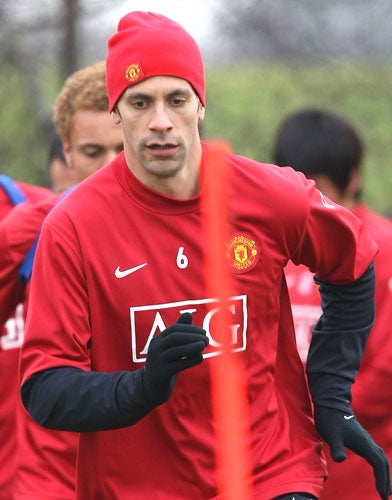Football accused in homophobia row
Players refuse to appear in video designed to combat prejudice

Your support helps us to tell the story
From reproductive rights to climate change to Big Tech, The Independent is on the ground when the story is developing. Whether it's investigating the financials of Elon Musk's pro-Trump PAC or producing our latest documentary, 'The A Word', which shines a light on the American women fighting for reproductive rights, we know how important it is to parse out the facts from the messaging.
At such a critical moment in US history, we need reporters on the ground. Your donation allows us to keep sending journalists to speak to both sides of the story.
The Independent is trusted by Americans across the entire political spectrum. And unlike many other quality news outlets, we choose not to lock Americans out of our reporting and analysis with paywalls. We believe quality journalism should be available to everyone, paid for by those who can afford it.
Your support makes all the difference.Professional footballers have refused to appear in a campaign video against homophobia because they fear being ridiculed for taking a stand against one of the sport's most stubborn taboos, The Independent has learnt. Both players and agents declined a request by the Professional Footballers' Association (PFA) to take part in a video which was to use high- profile players as figureheads in the association's drive against anti-gay prejudice.
The advertising agency Ogilvy, which was hired to produce the film, had advised that such involvement by well-known faces would be important if the campaign was to deliver the required impact. But instead, the FA was obliged to produce a generic "viral" anti- homophobic video – which was itself pulled earlier this week.
The revelation comes as a setback for campaigners who have finally begun to make progress in tackling homophobia in sport. Last month, former Welsh rugby captain Gareth Thomas took the unprecedented step of coming out as the first openly gay British rugby professional, an announcement that received widespread acceptance and praise. Last year, Donal Óg Cusack became the first openly gay Irish hurler – another aggressively hetrosexual sport. But last night Gordon Taylor, the PFA chief executive, said that the request by the players' union for involvement was not a straightforward one for players. "Everybody assumes footballers are full of confidence, but it is not easy on issues like this," he said. "Remember there was a time when even black players did not feel they could talk about race."
Peter Clayton, who chairs the FA's Homophobia in Football advisory group and is the FA's only openly gay councillor, said he too appreciated players' anxieties. "I suspect agents and clubs shied away from it," he said. "A player coming forward to appear in it would feel he might ignite more vitriol."
A PFA source added: "Maybe in three, four or five years we will have more players involved. At the moment, no one wants to be the player putting their head above the parapet. It's about the right time and the right place. Players give a lot; they get so many asks. Sometimes there has to be a 'no', and this was one of them."
On Monday the FA announced it was postponing the launch of an anti-homophobic video, pending a review of its entire anti-homophobia campaign.
That video featured a man directing anti-gay chants at a tube passenger, office workers and a newspaper seller. Due to be screened at Wembley, it aimed to point out that just as homophobia is unacceptable at work, it shouldn't be tolerated on the terraces either.
As the fallout continued from the FA's decision to pull the DVD – which generated more publicity than its creators could possibly have expected – gay activist Peter Tatchell said yesterday that the association should be doing more to encourage players to speak out: "I have always argued that we should involve players in this project, but we need to make a proper, organised effort to make that happen.
"I have said time and time again that Lord Triesman [the FA chairman] should write a personal letter to players, underlining the value of the campaign and asking them to be a part of it together with other players."
There is a widespread belief, shared by the PFA, that the only way of securing players' involvement in such a project is through a group of players contributing to a video.
There are some hopes at the PFA that the England national team might ultimately be the vehicle. The new England captain, Rio Ferdinand, remembered by many in gay circles for his use of the word "faggot" on a Chris Moyles radio show in 2006, was shamed into subsequently taking a more reconstructed view of homosexuality. He is one of the few current players to have even mentioned homophobia as a scourge in the game.
But despite the work spearheaded by football's "Kick it Out" organisation (founded in 1993, initially with a focus on racism), any serious progress on combatting homophobia may be some years off, at least for an English game whose only openly gay man, Justin Fashanu, was taunted and bullied and then killed himself in 1998.
Join our commenting forum
Join thought-provoking conversations, follow other Independent readers and see their replies
Comments